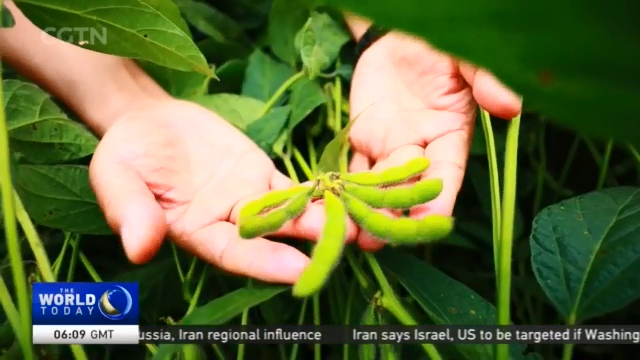
14:27, 23-Aug-2018
China Soybean Situation: Progress report on domestic production
Updated
13:42, 26-Aug-2018
02:42

With 25 percent retaliatory tariffs on US soybeans, many hope China reduces its reliance on them. One solution - grow soybeans domestically. Many feel this will be at least a short-term fix. CGTN's Xu Xinchen reports from Northeast China on how it could be a long-term solution too.
Cooking oil, livestock feed, bean products like tofu. Soybeans are one of China's top crops, used in those products and many others. Now, over 200 thousand acres of soybeans have been planted in the northeastern Chinese city of Heihe. That's the size of roughly 30 Chicago O'Hare International Airports.
HOU WENLIN, SUPERVISOR LINFENG AGRICULTURAL COOPERATIVES "We saw many farmers who planned on growing corn this year change their minds, planting soybeans instead. It added hundreds of acres worth of them."
Peoples' willingness to grow more soybeans is bolstered by preferential policies rolled out earlier this year. Bonuses are given to farmers who grow them in northeast China. The policies came amid China-US trade tension, and many see it as a way for China to reduce its dependency on foreign soybeans. China relies on 90 million tons of imported soybeans each year — one third of them from the US.
XU XINCHEN HEIHE, HEILONGJIANG PROVINCE "The dark soil here in Heihe is one of a kind — rich and perfect for soybean growth. About 1.9 million tons of soybeans are set to be harvested here by the end of September — amounting to over one tenth of China's total domestic soybean production."
Despite drought and inclement weather, experts say this is still a good year for Heihe.
CHEN SHUWEN, HEAD HEIHE AGRICULTURAL TECHNOLOGY EXTENSION CENTER "This year we expect to have another good harvest."
Chen Shuwen is the head of Heihe's Agricultural Technology Extension Center. He says while some farms might yield even more soybeans than those in the US and Brazil, other farms may only produce half of that. He adds that work needs to be done to ensure high production across different farms and regions
CHEN SHUWEN, HEAD HEIHE AGRICULTURAL TECHNOLOGY EXTENSION CENTER "Improving cultivation, deepening tillage, and making sure the soil holds water are the most direct and effective ways to ensure good production."
Chen is confident that the production of domestic soybeans will continue to rise, but says it could take years for domestic soybeans to truly compete with imported ones. China can now produce some 15 million tons of domestic soybeans — only about one tenth of the entire market. Xu Xinchen, CGTN, Heihe, Heilongjiang Province.

SITEMAP
Copyright © 2018 CGTN. Beijing ICP prepared NO.16065310-3
Copyright © 2018 CGTN. Beijing ICP prepared NO.16065310-3